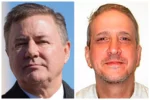
The Supreme Court was divided on Wednesday over Oklahoma death row inmate Richard Glossip, who is seeking a new trial after decades of maintaining his innocence for a murder he says he did not commit.
The justices will determine whether Oklahoma’s failure to disclose key evidence and correct false testimony violated Glossip’s due process rights and whether all suppressed evidence must be considered in determining the fairness of his trial. The high court also weighed whether a conviction should be overturned when the state no longer defends it and will address whether the state’s procedural law prevented Glossip from receiving post-conviction relief.

During the more than one-hour oral argument session, attorneys for Glossip were peppered with tough questions from at least three justices, especially Justice Clarence Thomas, who took issue with the lack of testimony from two prosecutors who were “central” to the facts of Glossip’s case.
The pair of prosecutors involved in Glossip’s case “suggest that their interviews were generally about prosecuting capital cases and not specifically about the details of this” one, Thomas said, wondering why the prosecutors’ positions about the case were largely absent from the case’s briefing.
The defense relies primarily on evidence that surfaced since an independent pro bono investigation into Glossip in 2022, which prompted the state’s Republican attorney general to believe that Glossip was not given a fair trial. The case has even attracted support from celebrities, including Dr. Phil.
By the end of oral arguments, there appeared to be a possible majority that could support Glossip’s request to have his case sent back to a lower court for further evaluation and a new trial.
Key background for Glossip’s case
Glossip has always maintained his innocence in the 1997 killing in Oklahoma City of his former boss, motel owner Barry Van Treese, in what prosecutors have alleged was a murder-for-hire scheme.
A key witness in Glossip’s conviction, Justin Sneed, admitted to robbing Van Treese and bludgeoning him to death with a baseball bat but testified he only did so after Glossip promised to pay him $10,000. Sneed received a life sentence in exchange for his testimony.
Glossip has admitted to helping Sneed cover up the murder after it happened but denies knowing that Sneed planned to kill Van Treese or encouraging him to do so.
Despite the defendant’s admission, Oklahoma Attorney General Gentner Drummond, a Republican, who was seated in the high courtroom on Wednesday, is hoping to see a favorable ruling for Glossip.
“This is a prosecutor who engineered a mid-trial change in Justin Sneed’s testimony and then denied doing so in the court. And stood silent in the face of false testimony she elicited about psychiatric treatment,” former U.S. Solicitor General Seth Waxman said on behalf of Glossip.
“He [Sneed] lied to the jury about his history of psychiatric treatment, including the fact that a prison psychiatrist prescribed lithium to treat his previously undiagnosed bipolar disorder,” Waxman added.
Chief Justice John Roberts pointed out that the jury during Glossip’s trial understood that Sneed was taking lithium, but what they did not know was that it was prescribed by a psychiatrist.
“Do you really think it would make that much difference to the jury?” Roberts asked Waxman.
Justice Ketanji Brown Jackson appeared to suggest that, at the minimum, the Supreme Court should send Glossip’s case back to the state level and evaluate whether any of the new evidence favored Glossip’s defense.
Paul Clement, a former U.S. solicitor general and veteran Supreme Court advocate who was seated next to the Republican state attorney general, represented Oklahoma on Wednesday.
Clement contended that there was indeed a failure by prosecutors to disclose evidence and a suppression of false testimony that occurred in the case.
“The state has one indispensable witness … and if that witness lies on the stand, perjures himself on the stand, that seems to me that could have a reasonable opportunity of leading to a different result,” Clement said.
Adherence to federalism could put Glossip in tricky situation
The largest hurdle that will have to be cleared for Glossip to achieve a victory at the Supreme Court is the bedrock of federalism that surrounds the entire case.
Christopher Michel, a former clerk to Roberts, was assigned to argue that Glossip’s conviction should be upheld.
Michel wrote in a brief that the defense’s argument is essentially “that the [Oklahoma Court of Criminal Appeals] should have explained its holding more thoroughly or that its holding is wrong. But neither of those positions is a valid basis for this Court to review a state-court decision grounded in state law.”
Furthermore, Michel argued that Glossip’s defense relies on a “significant overriding” of the prosecutor’s notes, to which Justices Samuel Alito, Roberts, and Thomas appeared sympathetic.
CLICK HERE TO READ MORE FROM THE WASHINGTON EXAMINER
The Supreme Court is likely to issue its ruling in the months ahead.
Justice Neil Gorsuch recused himself from the case because he had a previous encounter with Glossip’s case before he was on the Supreme Court.






